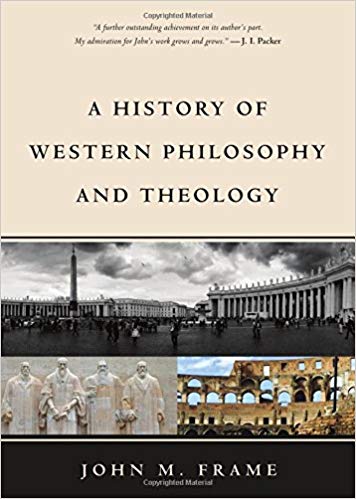Recommended Reading
From Amazon.com: "Christians should evaluate philosophy by biblical criteria. This will shed greater light on the developments in the history of philosophy and better prepare us for the intellectual challenges of our time. The fall of Adam brought intellectual as well as moral corruption on the human race, and the effects of the fall can be seen in the work of philosophers, most of whom try to understand the world autonomously through reasoning apart from God's revelation. Some philosophers have appealed to God's revelation, but their work has often been compromised with the wisdom of the world. Revelation should inform reason, and not the other way round. In the past, even Christian theology was corrupted by the movement toward intellectual autonomy, creating the tradition of liberalism, which has unhappily dominated academic theology down to the present day. But there is hope a new generation of Christian thinkers take God's Word seriously. Frame's unique new contribution augments that process."
If you purchase from one of our Amazon.com links, we receive a small commission that helps support this site and does not cost you any extra.
Online Master of Divinity Degree - Pros and Cons
For busy professionals who want to attend seminary, an online Master of Divinity degree may seem like a good idea. And let's be clear - online education definitely has its advantages. However, before you decide to pursue your online MDiv, it's important to weigh the pros and cons so you can make an educated decision.
Pros

The most obvious pro is the convenience of online education.
You don't have to quit your job, relocate, uproot your family, and all
of the other inconveniences associated with a traditional program. If
you need to keep your current job or have family concerns that might
prevent you from attending class, then an online Master of Divinity
degree has obvious perks.
Another asset to earning an MDiv online
relates to people's learning styles. If you're the kind of learner who
does best by going at his or her own pace and if you stress out over
note-taking or possibly missing a lecture, then the online delivery
format has many strengths. You will have access to all materials
(videos, audio lectures, handouts) and will be able to review them as
needed. Most if not all of correspondence with your professor will be
preserved for review.
Another potential strength to online
learning is the pacing of your degree. Depending on your personal
strengths and weaknesses as well the time you have available, you may be
able to proceed through the program faster than you could by a
traditional onsite MDiv program. If you take course overloads and are
able to do coursework and other requirements during the summers, you
could potentially shorten the time required for the degree (the MDiv is
typically three years).
Cons
Of course, there are many cons to
balance out the advantages of online learning. The main disadvantage to
any online degree, including an online MDiv, is the lack of community
or interaction with fellow students and professors. Sure, you will
engage your colleagues and professors via chatrooms, discussion boards,
and even face-to-face via Skype and the like, but let's be honest - it's
not the same as meeting over coffee to discuss the course or what's
going on in each other's life. If you're the kind of person who benefits
from collaborative learning, then you would be at a real disadvantage
in an online environment.
One disadvantage that would be
particular to programs like an MDiv are field requirements. Virtually
all onsite MDiv programs (at least all that I know of) require students
to gain practical experience working in a church, hospital, or other
ministry opportunity to put theology into practice. In fact, many
students often consider these opportunities to be a significant
component of their education, often with life-changing results. Unless
an online curriculum has the capability to implement field education for
every student, this significant component will be lacking.
Another
weakness of an online MDiv degree would be the lack of spiritual
community. Most seminaries and divinity schools have onsite worship
opportunities, whether it's community chapel, small groups, or other
corporate worship. Many students find their seminary communal worship
experiences to be a major part of their life as students. It's simply
not possible to incorporate such experiences into an online program.
Online Master of Divinity Degree - Final Words
Obviously, there are pros and cons to pursuing an online Master of Divinity degree. You should consider whether such a program is right for you after weighing the advantages and disadvantages, consulting with your pastor or church community, and praying for guidance.

